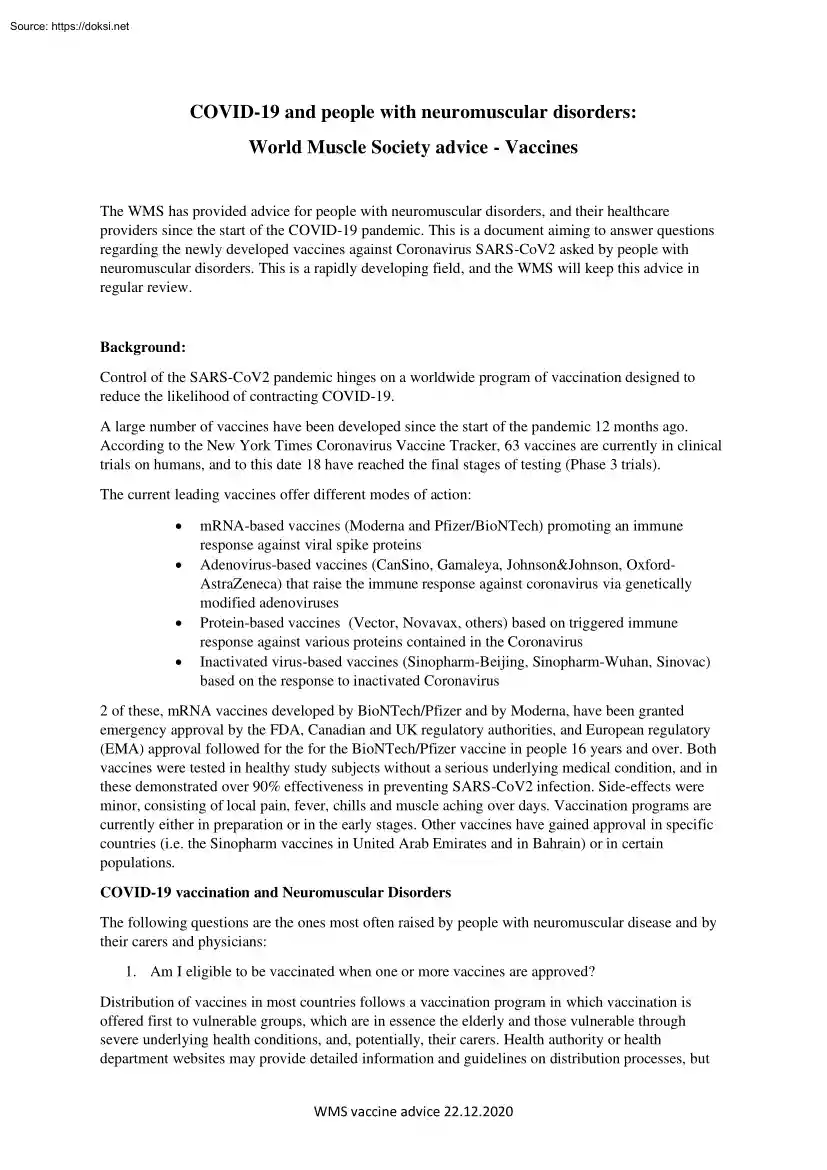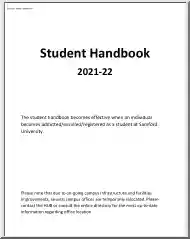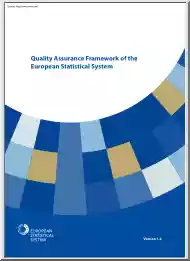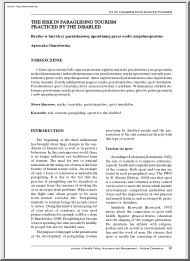Please log in to read this in our online viewer!

Please log in to read this in our online viewer!
No comments yet. You can be the first!
What did others read after this?
Content extract
COVID-19 and people with neuromuscular disorders: World Muscle Society advice - Vaccines The WMS has provided advice for people with neuromuscular disorders, and their healthcare providers since the start of the COVID-19 pandemic. This is a document aiming to answer questions regarding the newly developed vaccines against Coronavirus SARS-CoV2 asked by people with neuromuscular disorders. This is a rapidly developing field, and the WMS will keep this advice in regular review. Background: Control of the SARS-CoV2 pandemic hinges on a worldwide program of vaccination designed to reduce the likelihood of contracting COVID-19. A large number of vaccines have been developed since the start of the pandemic 12 months ago. According to the New York Times Coronavirus Vaccine Tracker, 63 vaccines are currently in clinical trials on humans, and to this date 18 have reached the final stages of testing (Phase 3 trials). The current leading vaccines offer different modes of action: • • • •
mRNA-based vaccines (Moderna and Pfizer/BioNTech) promoting an immune response against viral spike proteins Adenovirus-based vaccines (CanSino, Gamaleya, Johnson&Johnson, OxfordAstraZeneca) that raise the immune response against coronavirus via genetically modified adenoviruses Protein-based vaccines (Vector, Novavax, others) based on triggered immune response against various proteins contained in the Coronavirus Inactivated virus-based vaccines (Sinopharm-Beijing, Sinopharm-Wuhan, Sinovac) based on the response to inactivated Coronavirus 2 of these, mRNA vaccines developed by BioNTech/Pfizer and by Moderna, have been granted emergency approval by the FDA, Canadian and UK regulatory authorities, and European regulatory (EMA) approval followed for the for the BioNTech/Pfizer vaccine in people 16 years and over. Both vaccines were tested in healthy study subjects without a serious underlying medical condition, and in these demonstrated over 90% effectiveness in preventing SARS-CoV2
infection. Side-effects were minor, consisting of local pain, fever, chills and muscle aching over days. Vaccination programs are currently either in preparation or in the early stages. Other vaccines have gained approval in specific countries (i.e the Sinopharm vaccines in United Arab Emirates and in Bahrain) or in certain populations. COVID-19 vaccination and Neuromuscular Disorders The following questions are the ones most often raised by people with neuromuscular disease and by their carers and physicians: 1. Am I eligible to be vaccinated when one or more vaccines are approved? Distribution of vaccines in most countries follows a vaccination program in which vaccination is offered first to vulnerable groups, which are in essence the elderly and those vulnerable through severe underlying health conditions, and, potentially, their carers. Health authority or health department websites may provide detailed information and guidelines on distribution processes, but WMS vaccine advice
22.122020 may not specifically mention neuromuscular disorders. In addition, depending on the vaccines’ approval, only certain age groups may be eligible. 2. Am I in a priority group for vaccination? Most people with neuromuscular disorders are considered to be in the “vulnerable” group and have been observing strict measures to avoid COVID-19 throughout 2020. A further “highly vulnerable” group may be identified (see WMS position and advice document ”COVID-19 and people with neuromuscular disorders”, paragraph 1), and in these people vaccination may be a priority, but national health authority guidelines and definitions vary from one country to another. We advise all people with neuromuscular disorders to stay in contact with their healthcare providers and clarify their status, and the vaccination eligibility of their carers, once a vaccination program is available in their country. 3. Can I be vaccinated once a vaccine is approved or am I at risk of developing
COVID-19 or other severe side effects through the vaccination? There is no risk of developing COVID-19 from the vaccines currently approved or in final stages of development. We are not aware of any live vaccines under development Side effects in the study subjects have been mild and transient, and are outweighed by the benefits. There is no indication that neuromuscular patients should be different in this respect. For certain vaccines, with regard to specific neuromuscular treatments, particularly in clinical trials, there may be restrictions on when vaccination can take place, and uncertainties around interaction between the vaccination and the neuromuscular treatment. People with neuromuscular disorders on such treatments should contact their neuromuscular specialist or neuromuscular centre, who can contact the drug company providing treatment. 4. Will my neuromuscular condition affect the way the vaccine works? The mechanisms of action of the vaccines approved so far does not
suggest that neuromuscular disorders give an increased risk of side-effects. Neither should neuromuscular disorders that do not involve the immune system affect the way the vaccine works. However, the studies were carried out in healthy people aged 12 to 85 years. None had neuromuscular conditions, as far as we are aware, and therefore, there is no evidence regarding specific effects on people with neuromuscular disorders, or effects of the neuromuscular condition on the vaccination. 5. I take medication that affects the immune system (immunosuppressant drugs) Can I be vaccinated? Yes. There is no risk of infection through the vaccinations that have been approved or are in development so far. However, we do not yet know if immunosuppression potentially diminishes the effectiveness of the vaccination, so after vaccination, precautions (wearing a mask, social distancing) will still be necessary. 6. What are the important unknowns at present? Where the immune system is involved, either
through the neuromuscular disease itself or through its treatment, there is uncertainty whether the vaccine will be as effective as in the studies. This does not mean that the vaccine may be no good, but it does mean that caution and measures to avoid infection such as wearing masks and social distancing are still important. Currently, there is not enough evidence to advise whether one particular vaccine is preferable to the other. WMS vaccine advice 22.122020 The full range of side effects, including the rarer ones, will only be known in the further course of the vaccination program. So far, however, there has been no indication of any evidence to support a position rejecting vaccination. Authors of this document: Collated by Maxwell S. Damian, PhD, FNCS, FEAN and the members of the Executive Board of the WMS (www.worldmusclesocietyorg) in cooperation with members of the Editorial Board of Neuromuscular Disorders, official journal of the WMS Web-based resources:
https://www.worldmusclesocietyorg/news/view/150 https://www.whoint/news-room/q-a-detail/coronavirus-disease-(covid-19)vaccines?adgroupsurvey={adgroupsurvey}&gclid=Cj0KCQiAifzBRDjARIsAEElyGJRf2i ld8yaip1bGAG ldfus8GIFAkihYkD37OJctRqxjisTKd6oaApPQEALw wcB https://www.whoint/publications/m/item/draft-landscape-of-covid-19-candidate-vaccines https://www.govuk/government/collections/covid-19-vaccination-programme https://myasthenia.org/MG-Community/COVID-19-Resource-Center https://www.nytimescom/interactive/2020/science/coronavirus-vaccine-trackerhtml https://www.fdagov/emergency-preparedness-and-response/coronavirus-disease-2019-covid19/covid-19-vaccines https://www.sareptacom/sites/sarepta-corporate/files/202012/Community%20Bulletin COVID19pdf https://www.emaeuropaeu/en/news/ema-recommends-first-covid-19-vaccine-authorisation-eu https://www.emaeuropaeu/en/news/update-assessment-marketing-authorisation-applicationmodernas-mrna-1273-covid-19-vaccine WMS vaccine advice 22.122020
mRNA-based vaccines (Moderna and Pfizer/BioNTech) promoting an immune response against viral spike proteins Adenovirus-based vaccines (CanSino, Gamaleya, Johnson&Johnson, OxfordAstraZeneca) that raise the immune response against coronavirus via genetically modified adenoviruses Protein-based vaccines (Vector, Novavax, others) based on triggered immune response against various proteins contained in the Coronavirus Inactivated virus-based vaccines (Sinopharm-Beijing, Sinopharm-Wuhan, Sinovac) based on the response to inactivated Coronavirus 2 of these, mRNA vaccines developed by BioNTech/Pfizer and by Moderna, have been granted emergency approval by the FDA, Canadian and UK regulatory authorities, and European regulatory (EMA) approval followed for the for the BioNTech/Pfizer vaccine in people 16 years and over. Both vaccines were tested in healthy study subjects without a serious underlying medical condition, and in these demonstrated over 90% effectiveness in preventing SARS-CoV2
infection. Side-effects were minor, consisting of local pain, fever, chills and muscle aching over days. Vaccination programs are currently either in preparation or in the early stages. Other vaccines have gained approval in specific countries (i.e the Sinopharm vaccines in United Arab Emirates and in Bahrain) or in certain populations. COVID-19 vaccination and Neuromuscular Disorders The following questions are the ones most often raised by people with neuromuscular disease and by their carers and physicians: 1. Am I eligible to be vaccinated when one or more vaccines are approved? Distribution of vaccines in most countries follows a vaccination program in which vaccination is offered first to vulnerable groups, which are in essence the elderly and those vulnerable through severe underlying health conditions, and, potentially, their carers. Health authority or health department websites may provide detailed information and guidelines on distribution processes, but WMS vaccine advice
22.122020 may not specifically mention neuromuscular disorders. In addition, depending on the vaccines’ approval, only certain age groups may be eligible. 2. Am I in a priority group for vaccination? Most people with neuromuscular disorders are considered to be in the “vulnerable” group and have been observing strict measures to avoid COVID-19 throughout 2020. A further “highly vulnerable” group may be identified (see WMS position and advice document ”COVID-19 and people with neuromuscular disorders”, paragraph 1), and in these people vaccination may be a priority, but national health authority guidelines and definitions vary from one country to another. We advise all people with neuromuscular disorders to stay in contact with their healthcare providers and clarify their status, and the vaccination eligibility of their carers, once a vaccination program is available in their country. 3. Can I be vaccinated once a vaccine is approved or am I at risk of developing
COVID-19 or other severe side effects through the vaccination? There is no risk of developing COVID-19 from the vaccines currently approved or in final stages of development. We are not aware of any live vaccines under development Side effects in the study subjects have been mild and transient, and are outweighed by the benefits. There is no indication that neuromuscular patients should be different in this respect. For certain vaccines, with regard to specific neuromuscular treatments, particularly in clinical trials, there may be restrictions on when vaccination can take place, and uncertainties around interaction between the vaccination and the neuromuscular treatment. People with neuromuscular disorders on such treatments should contact their neuromuscular specialist or neuromuscular centre, who can contact the drug company providing treatment. 4. Will my neuromuscular condition affect the way the vaccine works? The mechanisms of action of the vaccines approved so far does not
suggest that neuromuscular disorders give an increased risk of side-effects. Neither should neuromuscular disorders that do not involve the immune system affect the way the vaccine works. However, the studies were carried out in healthy people aged 12 to 85 years. None had neuromuscular conditions, as far as we are aware, and therefore, there is no evidence regarding specific effects on people with neuromuscular disorders, or effects of the neuromuscular condition on the vaccination. 5. I take medication that affects the immune system (immunosuppressant drugs) Can I be vaccinated? Yes. There is no risk of infection through the vaccinations that have been approved or are in development so far. However, we do not yet know if immunosuppression potentially diminishes the effectiveness of the vaccination, so after vaccination, precautions (wearing a mask, social distancing) will still be necessary. 6. What are the important unknowns at present? Where the immune system is involved, either
through the neuromuscular disease itself or through its treatment, there is uncertainty whether the vaccine will be as effective as in the studies. This does not mean that the vaccine may be no good, but it does mean that caution and measures to avoid infection such as wearing masks and social distancing are still important. Currently, there is not enough evidence to advise whether one particular vaccine is preferable to the other. WMS vaccine advice 22.122020 The full range of side effects, including the rarer ones, will only be known in the further course of the vaccination program. So far, however, there has been no indication of any evidence to support a position rejecting vaccination. Authors of this document: Collated by Maxwell S. Damian, PhD, FNCS, FEAN and the members of the Executive Board of the WMS (www.worldmusclesocietyorg) in cooperation with members of the Editorial Board of Neuromuscular Disorders, official journal of the WMS Web-based resources:
https://www.worldmusclesocietyorg/news/view/150 https://www.whoint/news-room/q-a-detail/coronavirus-disease-(covid-19)vaccines?adgroupsurvey={adgroupsurvey}&gclid=Cj0KCQiAifzBRDjARIsAEElyGJRf2i ld8yaip1bGAG ldfus8GIFAkihYkD37OJctRqxjisTKd6oaApPQEALw wcB https://www.whoint/publications/m/item/draft-landscape-of-covid-19-candidate-vaccines https://www.govuk/government/collections/covid-19-vaccination-programme https://myasthenia.org/MG-Community/COVID-19-Resource-Center https://www.nytimescom/interactive/2020/science/coronavirus-vaccine-trackerhtml https://www.fdagov/emergency-preparedness-and-response/coronavirus-disease-2019-covid19/covid-19-vaccines https://www.sareptacom/sites/sarepta-corporate/files/202012/Community%20Bulletin COVID19pdf https://www.emaeuropaeu/en/news/ema-recommends-first-covid-19-vaccine-authorisation-eu https://www.emaeuropaeu/en/news/update-assessment-marketing-authorisation-applicationmodernas-mrna-1273-covid-19-vaccine WMS vaccine advice 22.122020




